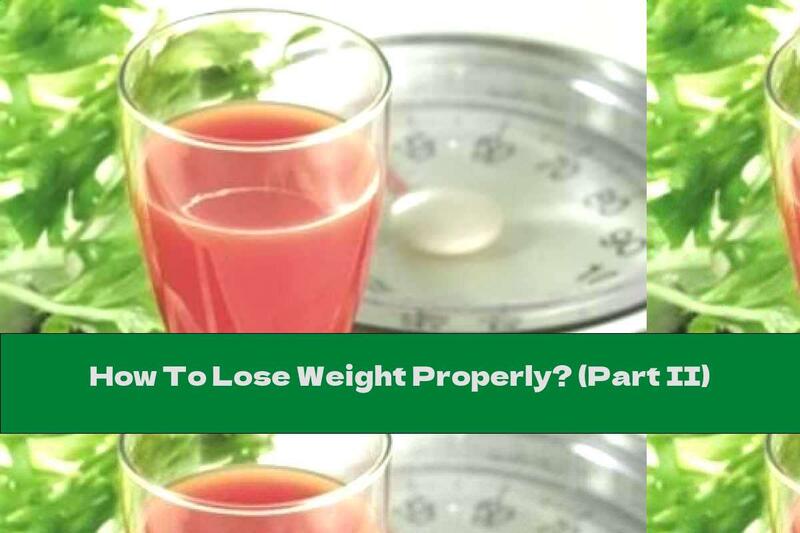How To Lose Weight Properly? (Part II)
 Author: Karen Lennox
Time for reading: ~3
minutes
Last Updated:
August 08, 2022
Author: Karen Lennox
Time for reading: ~3
minutes
Last Updated:
August 08, 2022

With age we inevitably gain weight. It is due to reduced synthesis of sex hormones. What to do to lose weight?
Stay cool
Our body, in addition to white fat, also contains brown, which is especially valuable because the body uses it to maintain body temperature. Until recently, nutritionists were not in favor of it, but recently it has been found that consuming just such fat, you lose weight. To achieve this effect, however, the Journal of Medicine recommends staying at a temperature no higher than 22 degrees. This promises a loss of 27 grams of body fat per day, compared to a temperature of 27 degrees.
Check testosterone
(especially for men)
If you are middle-aged and have already gained weight, it's not just because you lead a restricted lifestyle and eat a lot. Your body probably secretes too much of the female sex hormone ... estrogen. Although sex hormones are considered male and female, regardless of gender, the body synthesizes from both groups, but in different amounts.
With age, as in women the amount of estrogen released decreases, so in men the amount of testosterone synthesized decreases, which leads to weight gain. Adipose tissue accumulates around the waist, abdomen and chest, which is associated with an increased risk of diabetes and cardiovascular disease. Adipose tissue, in turn, has the ability to convert testosterone into estrogen, as they concentrate many enzymes that help the process. In order to stop this cycle of body fat formation and accumulation, active exercise is necessary. This is the only way, despite lower testosterone levels, for men to maintain an attractive appearance. Low testosterone can be corrected by taking testosterone as a supplement, but only when prescribed by an endocrinologist or andrologist.
More sun!
Vitamin D reduces the risk of all types of diseases such as cardiovascular disease, diabetes, multiple sclerosis and rheumatism. It also helps to lose weight, which has made it the most modern food supplement lately.
In the summer of 2008, in a small study of only 38 people, researchers at the University of Minnesota reported that those who had higher levels of vitamin D in their blood lost more weight. About 225 g of body weight is lost for each additional nanogram of the vitamin.
Other studies have linked high levels of vitamin D to lower levels of obesity.
An interesting proposal is made by the Imperial College of London.
Sunlight leads to the synthesis of vitamin D in the body. The amount of vitamin D that our body excretes in winter is less, which is why the body needs more food. Until recently, the recommended doses of vitamin D were 200 IU per day, but now experts from the Imperial College recommend 1,000, even 2,000 units. A daily dose of 1000 IU taken for several months increases the content of the vitamin in the blood to 10 ng / ml, which means that you can lose 2 ¼ kg more compared to the diet without vitamin D.
Rounded but healthy!
Do overweight always lead to poor health? A 2007 study by The Lancet found that about 30% of overweight people were healthy, well-functioning and low in cholesterol, normal blood pressure and blood sugar. In short, in one in three cases of overweight, weight loss is not necessary from a health point of view.
Researchers from the University of Montreal compare the effect of low-calorie diets on proper metabolism in obese people without health problems and those at risk for health. They found that insulin resistance improved in 26% of cases in the risk group, but worsened by 13% in clinically healthy, plumper people.
So, if your BMI is high and dangerous according to official standards, but you eat healthy and exercise, check your blood counts before you lose weight. It may be that you do not need to lose weight, but on the contrary could worsen your health.
Related Articles
- The Role of Water in Nutrition: Importance, Hydration, and Weight Management
- The Ultimate Guide to Hormone Type 5 Diet for Weight Loss and Health
- The Role of Hormones in Nutrition: Impact on Diet, Weight Management, and Health
- The Impact of Lifestyle Choices on Weight Management: Nutrition and Habits
- Lifestyle Choices Impacting Weight Management: Nutrition and Healthy Habits